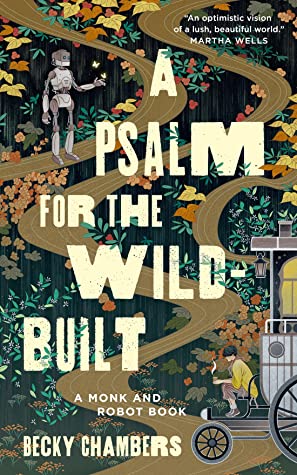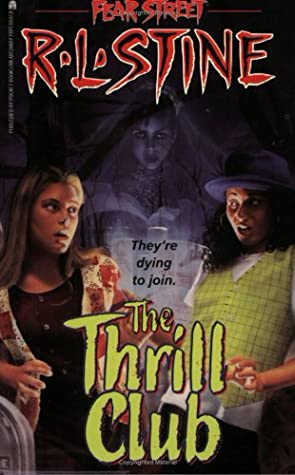 Summary [courtesy of Goodreads]: It’s been centuries since the robots of Earth gained self-awareness and laid down their tools. Centuries since they wandered, en masse, into the wilderness, never to be seen again. Centuries since they faded into myth and urban legend. One day, the life of a tea monk is upended by the arrival of a robot, there to honor the old promise of checking in. The robot cannot go back until the question of “what do people need?” is answered. But the answer to that question depends on who you ask, and how. They’re going to need to ask it a lot.
Summary [courtesy of Goodreads]: It’s been centuries since the robots of Earth gained self-awareness and laid down their tools. Centuries since they wandered, en masse, into the wilderness, never to be seen again. Centuries since they faded into myth and urban legend. One day, the life of a tea monk is upended by the arrival of a robot, there to honor the old promise of checking in. The robot cannot go back until the question of “what do people need?” is answered. But the answer to that question depends on who you ask, and how. They’re going to need to ask it a lot.
If Kay O’Neill’s Tea Dragon books were aimed primarily at philosophically-inclined adults who crave utopian (really post-dystopian) settings but equally cottagecore worldbuilding, you’d get this wonderful, meditative novella. Reading it was like experiencing the most perfect, anxiety-free day: laying on a blanket outside in the shade of a massive tree, grass everywhere and wind gently blowing; or cuddling up in the Fall with a cat [or six…], a blanket, and some herbal tea; or sitting in front of the fireplace in the middle of winter with the smell of gently burning embers lulling you to sleep. It just made me so happy, even though agender main character Dex isn’t always happy or content. In many ways, this is my ideal story: low-to-no-conflict, kind characters, a queer-normative world, and plenty of lush descriptions of the outdoors. (Also Sibling Dex becomes a tea monk and takes fastidious pride in figuring out complex healing concoctions, which we get described in great detail!)
Unlike O’Neill’s tea DRAGON books, this tea MONK series is (at least so far) about what happens when adults realize they aren’t content with their lives and don’t necessarily want to follow the “careers” they chose as younger people. In Chambers’ world, that’s perfectly fine, and Sibling Dex meets practically no resistance when they switch paths from more traditional, monastery-bound monk to itinerant, mobile-tiny-house-dwelling, therapist-adjacent tea monk; but the story truly takes off when Dex realizes that they’re still unhappy, despite their useful social role. Their spur-of-the-moment decision to temporarily abandon tea monk’ing to travel to a long-abandoned monastery (ostensibly to hear near-extinct crickets, which they’ve become mildly obsessed with) causes a meet-cute of sorts with a robot, the amazingly named Splendid Speckled Mosscap (so named because those mushrooms were the first thing it saw when it ‘woke’ up after being ‘wildbuilt’ from other robots’ parts).
Mosscap is a font of information and wisdom, and we get to learn much more about Dex’s utopian-seeming society through their conversations. From an ancient robot uprising to the decision by human societies to simply let them go free, to the later consolidation of human societies into small swathes of land (so as to leave the larger portions for other creatures), we get to glimpse an alternate future that seems heartbreakingly unrealistic. (The utopian elements are, as ever, far more sci-fi/fantasy than the sentient robots. But maybe that’s the point: as so many have said, we have to dream of things before they can become reality. And Chambers’ dreams here are, frankly, beautiful.)
But, again, utopian society doesn’t equal personal satisfaction. So we get to witness some truly beautiful existential conversations between Mosscap and Dex. (And the fact that I, philosophy-averse as I am, can call philosophical conversations “beautiful” is a goddamn miracle, and testament both to Chambers’ writing prowess as well as her character work.)
We get
—a mini-thesis on ethics and human-centric thinking when the question of pronouns arises:
“Do you have a gender? “No” “Me neither”
…
“So, it is correct, then? You wouldn’t prefer they or–?”
“Oh, no, no, no. Those sorts of words are for people. Robots are not people. We’re machines, and machines are objects. Objects are its.”
“I’d say you’re more than just an object,” Dex said.
The robot looked a touch offended. “I would never call you just an animal,Sibling Dex.”…
“We don’t have to fall into the same category to be of equal value.”
—a succinct description of mutual interconnectedness and human consumption:
“Every living thing causes damage to others, Sibling Dex. You’d all starve otherwise.”
—some fun interludes when Mosscap’s exuberant curiosity goes a little too far:
“Putting that inside me would harm me. Or attract animals.” Mosscap considered the latter point. “That could be interesting, actually.”
Dex narrowed their eyes. “You can’t bait yourself.”
“Why not? It’s a possibility I’ve never considered. I have bugs inside me all the time. Why not a ferret? That could be fun.”
“Sure. Or a bear.”
“Ah…”
—and (the part that made me cry) a concluding indictment about “purpose” and work that strikes right at the core of Dex’s problems, even as they live in the midst of an anti-capitalist utopia:
“So why, then, do you insist on having a purpose for yourself, on which you are desperate to find and miserable without? If you understand that robots’ lack of purpose–or our refusal of your purpose–is the crowning mark of our intellectual maturity, why do you put so much energy in seeking the opposite?”…
“You keep asking why your work is not enough, and I don’t know how to answer that, because it is enough to exist in the world and marvel at it. You don’t need to justify that, or earn it. You are allowed to just live. That is all most animals do.”
In our current capitalist hellscape moment, what could be more inspiring?
So, please, if you’re into calm, quietly funny stories with true cottagecore vibes, or if you like weird friendships developed over lengthy conversations, read this. It’s exquisite, and I can’t wait to read further in the series, the minute Chambers releases them.


